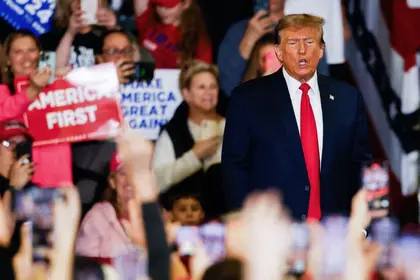Donald Trump's statements to the effect that only those Nato states that invest enough in their defence capabilities should benefit from alliance protection are a source of major concern in Europe. If the US is no longer a reliable partner, how could the continent organise its defence? How and to what extent should it rearm? Is Europe prepared to shoulder that responsibility? Commentators debate.
Take over the Nato command
JOIN US ON TELEGRAM
Follow our coverage of the war on the @Kyivpost_official.
Les Echos says it's time to prepare for potential developments in the US:
“The Europeans, particularly the French, Germans and British, must take command of Nato, both financially and strategically. ... There is a growing risk that we will see Ukraine capitulate to Russia due to a lack of ammunition. ... It is vital that Kyiv should be in a strong position on the - hypothetical - day that Donald Trump comes to power. And it is essential that the countries of Eastern Europe believe in our collective defence. Otherwise, each one will seek individual protection from Donald Trump. Without an alliance and without Europe.”
No European defence without solidarity
Rzeczpospolita poses the crucial question:
“While it is self-evident that an American from New York would die for an American from Los Angeles, the dilemma of whether a Spaniard would do so for a Pole is far trickier. After all, this is the reason why Poland spent 3.9 percent of its GDP on defence last year while Spain only spent 1.26 percent. And as long as there is no sense of solidarity among all Europeans, it will be very difficult for our continent to defend itself.”

EU Leaders Call For Increasing Electricity Exports to Ukraine
Set priorities, use resources effectively
Political scientist Ramūnas Vilpišauskas is cautiously optimistic about Europe's defence ambitions vis-à-vis Russia:
“On the one hand, the threat assessment gives reason to hope that the Nato countries are on the same page regarding the Russian threat, and this should translate into additional investment in the European defence industry and defence measures. ... On the other hand, resources are limited. ... Let's not forget that even without the US, the other Nato members are far ahead of authoritarian Russia in terms of economic and financial resources and technology. The key is to agree on priorities and use these resources in a targeted and effective way to protect our well-being and way of life.”
Germany's key military role
Adevărul asks whether the rapid rearmament of Europe, and in particular Germany, is the right response to Trump's threats:
“Yes, to the extent that the pressure from European generals warning that Ukraine will be completely dependent on supplies from the EU states grows. ... But can Germany become the largest arms producer in Europe? And do the defence and security of the countries on our continent depend on the production capacity of this country's military-industrial system? From a historical perspective, it's a delicate question. The answer must be weighed against the new realities of the world power market. If the Americans decide that they have spent enough on wars, how will Germany take over the leadership of the European military?”
Nuclear armament would be catastrophic
Naftemporiki is alarmed by reports that nuclear weapons are also under discussion in Germany:
“Unfortunately, the debate about arming the EU with nuclear weapons is not being conducted in some basement by a group of right-wing extremist, war-loving madmen. ... Yet Germany signed the Nuclear Non-Proliferation Treaty. ... A withdrawal by Germany from this obligation under international law would represent a significant escalation in the existing conflict with Russia. The belief that the doctrine of nuclear deterrence creates security is a myth. On the contrary: Europe's nuclear armament would bring us to the brink of nuclear war.”
You can also highlight the text and press Ctrl + Enter






